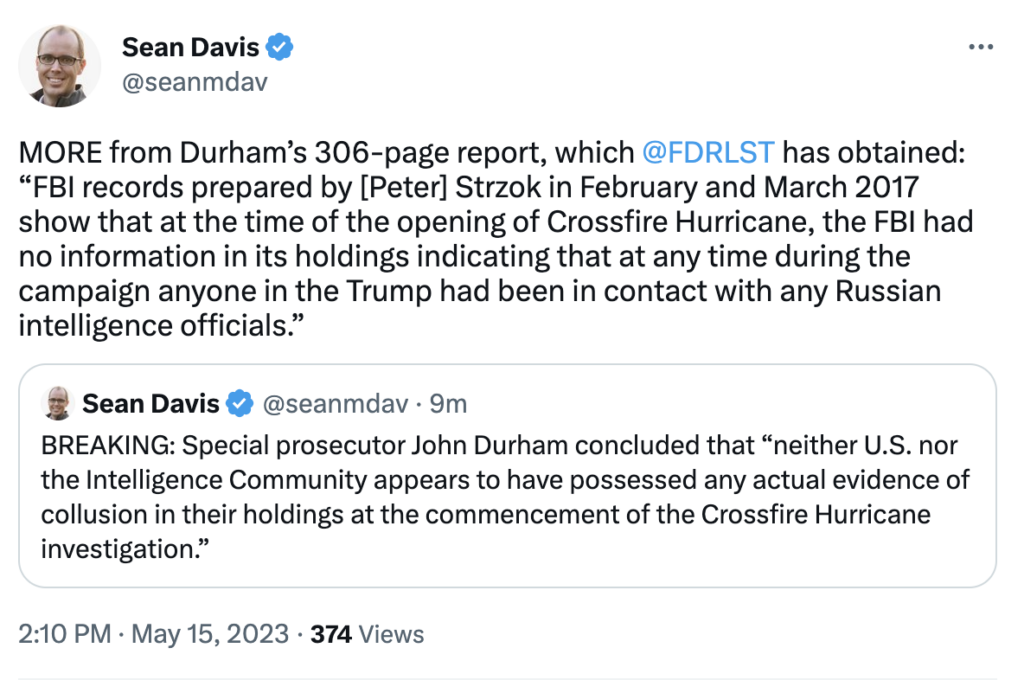Special Counsel John Durham released a 306-page report on Monday detailing how Democrat operatives packaged and sold a lie to the all-too-believing Obama administration FBI that former President Donald Trump colluded with Russia to steal the 2016 election.
For more than six years now, corrupt corporate media and Democrats have rallied around that allegation as evidence that Trump shouldn’t hold office. But Durham’s latest report, much like previous investigations into the Russian collusion hoax, once again found that there was no evidence of collusion from the beginning.
“Indeed, based on the evidence gathered in the multiple exhaustive and costly federal investigations of these matters, including the instant investigation, neither U.S. law enforcement nor the Intelligence Community appears to have possessed any actual evidence of collusion in their holdings at the commencement of the Crossfire Hurricane investigation,” Durham wrote in the opening pages of his bombshell report concluding three years of investigation.

Despite repeated smears and pushback from the ruling class and professional hoaxing outlets like The New York Times, Durham uncovered several red flags that should have dissuaded the FBI from opening its “seriously flawed” Crossfire Hurricane investigation into the Trump campaign — but didn’t because the agency was too wrapped up in its hatred for the 2016 Republican presidential candidate.
“Throughout the duration of Crossfire Hurricane, facts and circumstances that were inconsistent with the premise that Trump and/or persons associated with the Trump campaign were involved in a collusive or conspiratorial relationship with the Russian government were ignored or simply assessed away,” Durham continued.
Durham says it was “confirmation bias” at “minimum” that led to the FBI’s years-long malfeasance. Even before the investigation commenced, he noted, many of the people involved “expressed their open disdain for Trump,” demanded knowledge of when an investigation into Trump would occur, and “asserted that they would prevent Trump from becoming President.”
Deputy Assistant Director for Counterintelligence Peter Strzok, who officially opened Crossfire Hurricane at the direction of Deputy FBI Director Andrew McCabe, specifically “had pronounced hostile feelings toward Trump.”
It was that bias, Durham confirmed, that led the FBI to commit dozens of violations in its Foreign Intelligence Surveillance Court applications for searches and surveillance of those close to Trump — especially Carter Page, who was spied on by the FBI despite 17 “material errors and omissions” in their application.
Here’s everything the FBI “simply ignored or in some fashion rationalized away” in order to taint the reputation of their sworn political enemy.
Tavern Talk
The FBI says it began its investigation into Trump after Australian officials informed investigators on July 28, 2016 that George Papadopoulos, an unpaid foreign policy adviser to the Trump campaign, made an offhand comment about Russia and the 2016 election in a tavern conversation.
The U.S. government, Durham noted, “possessed no verified intelligence reflecting that Trump or the Trump campaign was involved in a conspiracy or collaborative relationship with officials of the Russian government.” In fact, Durham says Australian diplomats told FBI officials that Papadopoulos “never stated that he had any direct contact with the Russians nor did he provide any explicit information about an offer of assistance,” but that didn’t matter to the FBI which officially began targeting Trump on July 31, 2016, three days after it received the report from Down Under.
‘A Complete Lack of Corroboration’
Not only did the FBI predicate its investigation on hearsay, but Durham says it failed to corroborate the information it received with any other intelligence agency.
“Although the Counterintelligence Division did eventually seek information about Papadopoulos, the Office found no indications from witness testimony, electronic communications, emails, calendar entries, or other documentation that, at the time, the FBI gave any consideration to the actual trustworthiness of the information the diplomats received from Papadopoulos – an individual whom they described as, among other things, ‘insecure’ and ‘trying to impress’ them,” Durham warned.
Hide the Evidence
Papadopoulos and Page were among several Trump advisers who made statements to FBI confidential human sources that, under normal FBI protocols, would have cleared them from suspicion.
Durham said the FBI recorded these statements but that “Crossfire Hurricane investigators failed to make that information known to the Department attorneys or to the [Foreign Intelligence Surveillance Court].”
When Crossfire Hurricane investigators finally did provide information, it was “only partial, and in some instances misleading” as not to let the FISC “cast real doubt on their probable cause assertions.”
Ignoring Inconvenient Leads
Durham says the FBI not only excluded key exculpatory information but also “failed to pursue investigative leads that were inconsistent with their theory of the case.”
This specifically affected Page, about whom Durham says the FBI “failed to follow logical investigative leads” about his “recorded denials of having any relationship with Paul Manafort, a fact about which there was available evidence.”
One-Sided Story
On Sept. 23, 2016, Michael Isikoff published an article in Yahoo! News alleging that Page had meetings with Igor Sechin, a chairman of a Russian energy conglomerate, and Igor Divyekin, a senior official in the Russian presidential administration. It was undersigned by a “well-placed Western intelligence source,” now thought to be Christopher Steele, and a “senior U.S. law enforcement official.”
“The article contained information that was nearly identical to Steele Report,” Durham noted.
Yet, when Page wrote FBI Director James Comey offering to be interviewed about this report, the FBI chose to spy on him instead.
Strong as Steele?
The FBI was able to spy on Page, a U.S. citizen, because it used the “completely unvetted and uncorroborated” Steele dossier as the basis for its flawed FISA applications. Durham said the Crossfire Hurricane investigators “had determined that there were major conflicts between the reporting of Steele and his primary sub-source, Igor Danchenko” but “incredibly failed to resolve” them.
Not only did the FBI take Steele’s shaky word as fact, but investigators never questioned him about his leak to Yahoo! News which “essentially accused Carter Page of colluding with the Russians.” Instead, “investigators demonstrated a willingness to contort the plain language of the article to suggest it was not Steele but Steele’s employers who had given the information to Isikoff.”
Additionally, Durham found that “at no time before, during, or after Crossfire Hurricane” did the FBI “corroborate a single substantive allegation in the Steele dossier reporting.”
The Igor Issue
Steele primarily relied on an unnamed “Primary Sub-Source,” now known to be Russian national Igor Danchenko, to create his dossier. The FBI, in other investigations, would try to vet a source like Danchenko. Instead, in “a complete failure,” the FBI never even bothered to look into “the serious counterespionage issues surrounding” Danchenko.
The Closed Clinton Loop
The Clintons’ fingerprints were all over the Russian collusion hoax from the start but the FBI once again brushed that off.
“The FBI leadership essentially disregarded the Clinton Plan intelligence, which it received at almost the exact same time as the Australian Paragraph Five information,” Durham outlined. “This was despite the fact that at precisely the same time as the Clinton Plan intelligence was received (i) the Clinton campaign made public statements tying DNC computer hack to Russian attempts to help Trump get elected, (ii) the FBI was receiving the Clinton campaign-funded Steele Reports, and (iii) the Clinton campaign-funded Alfa Bank allegations were being prepared for delivery to the media and the FBI.”
Double Standard
There was evidence that one presidential campaign operative had ties to the Kremlin but he didn’t work for Trump. Despite the fact that the FBI received information in October of 2016 about Charles Dolan, a Democrat operative with ties to the Clintons “who also possessed significant ties to Russian government figures who would appear in the Steele reporting,” he was mysteriously “never interviewed.”
“Unlike the FBI’s opening of a full investigation of unknown members of the Trump campaign based on raw, uncorroborated information, in this separate matter involving a purported Clinton campaign plan, the FBI never opened any type of inquiry, issued any taskings, employed any analytical personnel, or produced any analytical products in connection with the information,” Durham noted.








